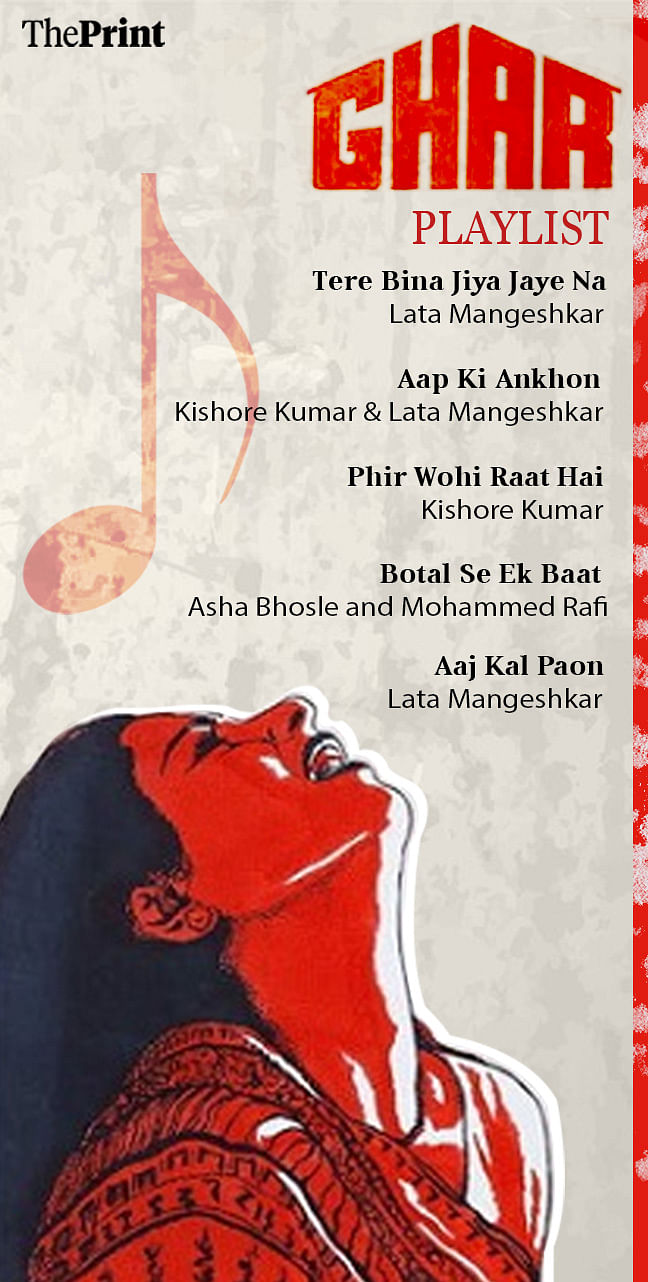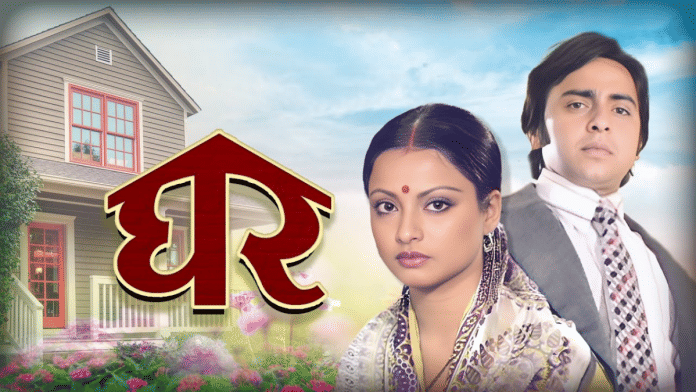Manik Chatterjee’s 1978 film Ghar is one of the rare movies that looks at the aftermath of rape and its impact on a couple’s relationship without many missteps. Written by Dinesh Thakur, Ghar looks at the complexities of a survivor’s emotions without the loud dramatics that easily overshadow films about violence against women in the ’70s and ’80s.
Ghar is unlike most films that focus on the home. For instance, it doesn’t show that a woman’s sacrifice and honour are paramount to holding a household together. Rather, Chatterjee asks: What happens when that ‘honour’ is compromised? How does a ghar or home survive sexual assault? These questions are explored through the marriage of Vikas (Vinod Mehra) and Aarti (Rekha).
Vikas and Aarti are in love, and despite parental opposition, they decide to get married. They sing beautiful songs, find a house to start their life, and slowly settle into marital bliss. One evening, while returning from a late night show, some men kidnap Aarti after beating Vikas to a pulp. She is found a few days later after being gang-raped and dumped on the street.
The story then moves to the aftermath of the trauma and its impact on the previously fairytale-like story of the couple. The film was remade in Tamil as Kaadhal Kiligal (1980).

Also read: English is a very funny language—Bachchan gave the OG Bollywood monologue in ‘Namak Halaal’
What happens after rape
Ghar explores what happens when a woman is violated and has to rebuild her life. It also poses the question of safety. Unlike in many other Bollywood flicks, in Ghar, rape is no opportunity for the male protagonist to become the hero and bash up the bad guys. Neither does it show Vikas ‘avenging’ the honour of his wife. The crime happens, and the hero is unable to save his wife. The young couple are left to pick up the pieces of their marriage.
Moreover, rape isn’t shown through the site of trauma–the heroine’s body–but through the facial expressions of the perpetrators. There is a conscious attempt to not titillate the incident unlike in films like Insaf Ka Tarazu (1980) or Sharmeelee (1971). Ghar also steers clear of the kind of saviour complex in movies like Hamara Dil Aapke Paas Hai (2000), where Anil Kapoor plays the hero to Aishwarya Rai’s character after her rape.
Ghar tries to go beyond the surface level of crime and revenge to explore rehabilitation, without completely making a saintly figure out of Vikas. The couple understands the ‘normal’ after the rape in different ways. For Aarti, there is no going back to the before, and for Vikas, forgetting all about the rape and moving on is the way. Things come to a head in a scene where Aarti asks Vikas for a favour, and he replies, thoughtlessly, that he would agree to anything but watching a Bollywood film. This is a triggering moment for Aarti, as the night the duo were out and she was attacked they had opted to watch a Bollywood film at her insistence.
Vikas does apologise, but through that moment, Chatterjee outlines the loss of normalcy for the couple.
Another sensitive issue Ghar focuses on is physical intimacy. For Aarti, the trauma is haunting, and she feels unable to have sexual intercourse with her husband. While Vikas does not coerce her, the extreme positivity does not help either. His patience and understanding are not nuanced. And since it is not rooted in actual understanding, one day he loses his cool when she asks, “Are you not tired of pretending everything is okay?” and slaps Aarti. She leaves for the railway station, wounded by the behaviour of the person from whom she most desires patience and understanding.
Starting a conversation
Ghar’s ending follows the ‘happy ending’ trope but not before it forces the audience to engage with the repurcussions of the sexual assault and how even the most ‘loving’ partner can fail to be the kind of support system one needs. Rekha displays her acting range most prolifically as she navigates her character from the woman deeply in love and hopeful of the future to the victim steeped in deep trauma after the rape. The layers of her experience shine through even when she has no dialogues, her eyes showing the unspoken yearning for her husband to understand her turmoil.
Mehra plays the role of the well-meaning but clueless partner with perfection. He is challenged to express his emotions or listen with a certain emotional capacity. The ‘understanding’ friend, Seema (Prema Narayan), is Vikas’ unpaid therapist to make him understand Aarti’s state of mind.
Despite its shortcomings, Ghar attempts to start a conversation around rape and trauma, which is absent from most Bollywood films to date. The film’s storytelling is perfectly lifted by its album, penned by Gulzar, with RD Burman providing the music. It is like a balm to the soul, with songs like Phir Wohi Raat Hai, Tere Bina Jiya Jaye Na and Aap Ki Aankhon. The first song, which established the initial romance between Aarti and Vikas, is also the background score for when the two tearfully reconcile at a railway station.
(Edited by Humra Laeeq)






